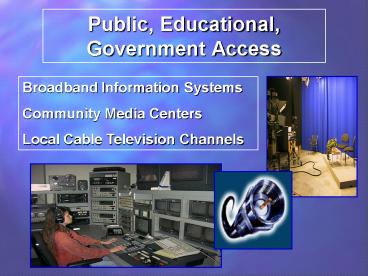PowerPoint Presentation BuskePEG Innovations PowerPoint PPT Presentation
1 / 21
Title: PowerPoint Presentation BuskePEG Innovations
1
Public, Educational, Government Access
Broadband Information Systems Community Media
Centers Local Cable Television Channels
2
What Is Public, Educational, Government (PEG)
Access?
- Public, educational, government access means
the availability of the cable system for use by
various organizations, groups, agencies,
institutions, City government, and individuals in
the community to create and distribute
programming not under the control of the cable
company.
3
Why Can Local Government Require PEG Access?
- The purposes of the Cable Communication Policy
Act of 1984 include - to assure that cable communications provide and
are encouraged to provide the widest possible
diversity of information sources and services - to assure the cable systems are responsive to
the needs and interests of the local community
4
What Type of PEG Support Can Local Governments
Negotiate?
- Channel Capacity/Bandwidth Public, Education,
and Government Access - Technical Capability
- Two Way Functionality
- Remote origination points
- Institutional Network
- PEG Facilities and Equipment Support
- Community Media Access Centers/Facilities
- Equipment for Use by organizations, neighborhood
leaders, institutions, etc.
5
What Type of PEG Support Can Local Governments
Negotiate?
- PEG Services Support
- Training
- Program playback
- Other Services to support community and
neighborhood use of cable system
6
Has PEG Changed in the Past 20 Years?
- Community uses of the cable system (PEG Access)
have changed dramatically - Changes in Technology Used by Cable System
Operators - Changes in the Tools/Equipment to create the
program/information to be distributed by PEG - Changes in the Approach to operating PEG
Access/Community Media Centers - Customer Service based approach
- Changes in who operates the Community Media
Center
7
The Evolution of PEG Access to Community Media
- With the convergence of all media into digital
formats cable systems have become broadband
communications networks for voice, graphics,
video and audio. To adapt to these technical
changes, and the changes in media culture they
bring about, community access centers are
becoming - Community Media Centers.
8
State of Art CommunityMedia Centers
- Use A Variety of Media to Distribute Community
Content - Cable (both subscriber network and Institutional
Network (I-Net) - Internet and other Wide Area Networks
- Radio and SAP
- Over-the-Air Television (LPTV PTV)
- Video Tape Distribution
9
State of Art Community Media Centers
- Programming/Content/Information
- City Wide Cable Programs/ Communications
- Neighborhood or area wide Cable
Programs/Communications - Regional Programs/Communications
- Content delivered on demand
10
State of Art Community Media Centers
- Programming/Content/Information
- Content Created by CBOs, Educational
Institutions, Neighborhood Groups, Local
Government Agencies, and residents - Grant-Funded Programming
- Long-Term Collaborative Projects
11
State of Art Community Media Centers
- Facilities and Equipment
- Facilities
- Studios, Master Control, Offices, and
Neighborhood/Satellite Centers - Equipment
- Video Production, Computers, Suitcase Studios,
Editing,
12
State of Art Community Media Centers
- Training
- Video Production Training
- Computer Literacy Training
- Job Training
- Video as a curriculum tool
- Media Literacy
- Effective Communication
13
State of Art Community Media Centers
- Collaborations
- Broad Community Representation
- Technical Assistance to CBOs and Neighborhood
Groups - City-Wide Projects
- Neighborhood Projects
- Inter-Institutional Collaborations
14
Community Media Centers
- Management Approach
- Collaborative or Separated
- PEG under one roof
- Usually found in midsize and smaller cities
- Separate PEG management entities
- Combo P-E or Combo P-G
15
Community Media Centers
- Management Structure
- Managed by an organization established
specifically for that purpose - Time tested most successful approach for Public
Access (in all size cities) - PEG in midsized and smaller cities
- Community leaders on Board
- Professional Manager answerable to Board
16
CMC Innovations
- Mobile Media Lab (moLLie)
- Community Media Center/GRTV
- Grand Rapids, Mi.
- Mobile Learning Lab
- 20 iBooks with iMovie
- Digital cameras
- Connects back to CMC via I-Net (full frame video)
or using wi-fi. - Dirk Koning, Ex. Dir. 616-459-4788 x 101
17
CMC Innovations
- Video on Demand Video Streaming
- Monterey, Ca. Access Monterey Peninsula
- AMP serve as media librarian for VOD over
I-Net, Internet, preparing for an all request VOD
PEG channel on subscriber network - Using server to store content/programs
18
CMC Innovations
- Video on Demand Video Streaming
- Monterey, Ca. Access Monterey Peninsula
- Users can put info on web page it is published
on interactive video bulletin board.
(Edgecast-Scala integration) - Streaming 3 PEG channels over Internet 24/7
- Paul Congo, Ex. Dir. 831-333-1267
19
CMC Innovations
- Video on Demand
- Iowa City, IA City of Iowa City
- VOD Selections from Council Agenda
- Drew Shaffer 319-356-5046
- Shrewsbury, MA. Shrewsbury Media Connection
- Bill Nay 508-841-8650
20
CMC Innovations
- Mentor Based Approach to PEG Service Delivery
- Santa Rosa Community Media Center
- Santa Rosa, Ca.
- Each new CMC User is assigned a mentor
- Mentor does an assessment to determine what CMC
services resources are needed to assist user in
achieving goal - Laurie Cirivello, Ex. Dir. 707-569-8785 x26
21
Renewal Outcomes
- Bandwidth for Community Use
- Funding Resources to support Community Media
Centers - Institutional Networks
- Two-way functionality and capacity
- PEG channels located on same numerical location
citywide and between multiple cable operators
serving the same City - CMC/PEG programs listed on TV Guide Channel and
IPG

